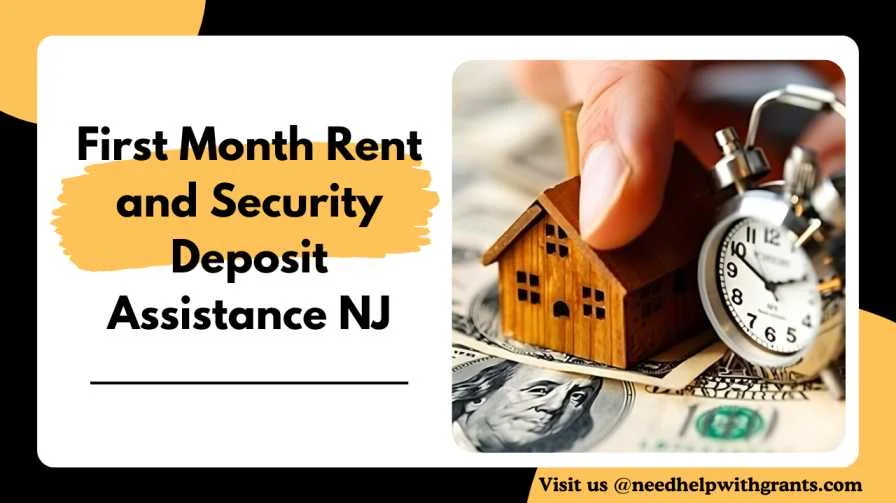Finding a stable home in New Jersey can be challenging, especially for those struggling with high rent. The first month’s rent and security deposit are often major financial obstacles. Fortunately, New Jersey has many assistance programs aimed at helping individuals and families overcome these challenges, and create safe living conditions. This guide explores programs and resources for residents who need help with these expenses.
New Jersey is known for its high cost of living, and many renters face financial pressures to afford housing as average rents continue to increase in New Jersey. This makes it more difficult for low-income families—single parents and seniors who will pay the rent for the new house in advance.
Government Programs for First Month Rent and Security Deposit Assistance NJ
Here are the most demanding government programs for rent and security deposit assistance in NJ. Contact these programs if you need more details.
Federal Programs
- Section 8 Housing Choice Voucher
This program provides rent assistance for low-income households. Although most are for rent some local authorities may also cover the security deposit. Applicants must meet income criteria, and waiting lists are common.
- Emergency Rental Assistance Program (ERAP)
ERAP was created during the pandemic. It helps cover past-due rent and security deposits for those affected by COVID-19. New Jersey residents can apply through their local ERAP office.
- Continuity of Care (CoC)
The CoC supports homeless individuals or those at risk of homelessness by assisting with rent deposits. Local non-profit organizations in New Jersey manage these funds.
State Programs
- State Rental Assistance Program (SRAP)
SRAP offers rental assistance similar to Section 8 but is state-funded. It helps low-income families and seniors, sometimes covering security deposits.
- Homelessness Prevention Project (HPP)
HPP provides emergency assistance to prevent eviction or homelessness by covering rent, mortgage, or security deposits. Eligibility will depend on income and the severity of the housing crisis.
- Temporary Rental Assistance (TRA)
The TRA provides short-term rental deposit support for people experiencing financial hardship, such as job loss.
- WorkFirst NJ Housing Assistance
Offers grants for rent and security deposits to low-income families in the WorkFirst NJ program, which supports individuals receiving TANF or GA benefits.
Non-Profit Organizations Providing Rent Assistance in NJ
Here I have described some nonprofit organizations also that provide rent assistance in NJ.
Salvation Army
The Salvation Army provides emergency financial assistance for rent and security deposits throughout New Jersey. Their program is designed to help those facing eviction or struggling to pay the upfront costs of finding a new home. Local branches throughout the state offer a variety of assistance based on availability and need.
Catholic Charities
Catholic Charities operates housing assistance programs throughout New Jersey and helps low-income people and their families by covering outstanding rent, security deposits, and utility bills. Their mission is to address homelessness and support vulnerable communities in creating stable housing.
Jewish Family Services
Jewish Family Services (JFS) provides emergency rental assistance and support services to individuals and families of all backgrounds. They focus on eviction prevention and provide short-term financial assistance or bail bond assistance. JFS also provides case management to ensure long-term housing stability.
Volunteers of America (VOA)
Volunteers in the United States run several projects to help at-risk populations including rental assistance for veterans, seniors, and the disabled, their housing program focuses on preventing homelessness in New Jersey by providing financial assistance for rent deposits.
How to Get Rental Assistance in NJ?
Getting rental assistance in New Jersey can be important for individuals and families facing financial challenges. There are many options to choose from including government projects, non-profit organizations, and emergency relief funds Step-by-step instructions on how to apply and get the help you need.
Determine Eligibility
Before applying, check if you qualify for rental assistance. Most programs are based on income:
- Applicants must meet low or moderate-income requirements.
- Household size: Larger households are eligible for additional assistance.
- Residence status: Priority is often given to those facing eviction, homelessness or financial hardship
Explore Government Programs
- Section 8 Housing Choice Voucher Program: Apply through your local housing authority for long-term rent assistance.
- State Rental Assistance Program (SRAP): NJ’s state-funded rent assistance program, similar to Section 8.
- Emergency Rental Assistance Program (ERAP): Assists with past-due rent and future payments to households affected by COVID-19.
- Homelessness Prevention Program (HPP): Provides short-term emergency rental or deposit assistance.
Reach Out to Non-Profit Organizations
Numerous non-profits in New Jersey offer rent and security deposit assistance, including:
- The Salvation Army
- Catholic Charities
- Jewish Family Services
- Volunteers of America
You can apply directly through their local offices or websites. Each organization may have different eligibility criteria, so it’s important to review their requirements before applying.
Contact Local Social Services
Your county’s social services office can guide available rental assistance programs, including:
- WorkFirst NJ Housing Assistance
- Temporary Rental Assistance (TRA)
They can help you apply for both government and non-profit programs. This will ensure that you receive all the support available.
Gather Required Documentation
Prepare the following documents when applying for rental assistance:
✔️Proof of income (pay stubs, tax returns)
✔️Identification (ID, Social Security number)
✔️Lease agreement or eviction notice
✔️Proof of financial hardship (medical bills, job loss documentation)
✔️Having these ready will streamline the application process.
Apply Online or In-Person
Many programs allow you to apply online through a website or portal. Some programs may require you to apply in person at a local office or non-profit organization. The application must be filled out correctly and provide all requested documents.
Follow Up
After submitting your application, it’s important to:
- Track your application status
- Submit any additional information if requested
- Contact the program or organization to check on the progress if you do not hear back promptly.
By following these steps and applying to the appropriate programs, you can increase your chances of receiving rental assistance in New Jersey, helping you secure or maintain housing during difficult times.
List of Security Deposit Assistance Programs
Here is the list of security deposit assistance programs for you:
- Homelessness Prevention Project (HPP)
HPP provides emergency financial assistance to prevent homelessness. It is administered by the New Jersey Department of Community Affairs. This program can cover security deposits, overdue rent, and utility costs for eligible homes.
- Jewish Family Services (JFS)
Jewish Family Services provides insurance assistance to individuals and families facing financial hardship. The purpose of those programs is to prevent homelessness by providing one-time financial assistance for housing-related expenses.
- State Rental Assistance Program (SRAP)
While focusing primarily on rental support the State Rental Assistance Program (SRAP) can also help qualified applicants with security deposits. The state-funded program is available to low-income New Jersey residents.
- WorkFirst NJ Housing Assistance
Through the WorkFirst NJ program, TANF or General Assistance participants can receive insurance assistance. It is part of a comprehensive financial assistance package aimed at preventing homelessness and stabilizing housing.
- United Way
Local United Way branches in New Jersey provide emergency financial assistance including assistance with insurance payments to families and individuals experiencing financial difficulties Aid will vary depending on location and availability of funds.
New Jersey Rental Assistance Program
New Jersey’s Rental Assistance Program (SRAP) is a state-funded initiative that helps low-income families, seniors, and people with disabilities afford housing. This program is similar to the federal Section 8 Housing Choice Voucher program which is funded and managed by New Jersey.
Rental assistance
SRAP provides direct financial assistance to cover part of the cost of a home. This helps make housing more affordable for low-income residents.
Long Term Support
Unlike emergency assistance programs, SRAP can provide long-term rental support to ensure stability for families and qualifying individuals.
Eligibility Requirements
Income: Applicants must meet income requirements. This depends on the area’s average income and household size.
Residency: Applicants must reside in New Jersey.
Housing status: Priority is given to homeless individuals. People at risk of homelessness and those with severe rent burdens.
Housing Choice
Participants can choose any residence that meets program requirements. As long as the homeowner agrees to participate in SRAP.
How to Apply for SRAP?
To apply for first month rent and security deposit assistance in New Jersey, start by researching programs available through the New Jersey Department of Community Affairs (DCA).
✅Research Available Programs
Start by researching programs in New Jersey that offer assistance for first month rent and security deposits. Contact the New Jersey Department of Community Affairs (DCA) and your local county housing assistance office, as both can provide support options. Local nonprofits, such as Catholic Charities and United Way, also offer financial assistance programs for housing.
✅Determine Your Eligibility
Each program has specific eligibility criteria based on income, family size, and financial need. Check the requirements for each grant program. This is because some projects focus on people facing migration, homelessness, or sudden financial hardship. Reviewing the eligibility details can save you time by focusing on programs for which you qualify.
✅Gather Necessary Documents
Prepare essential documents, including proof of income, identification, and your current housing situation. Many programs also require a rental agreement or lease as proof of your housing needs. Having these documents ready will help streamline the application process.
✅Apply Through the Proper Channels
Once you’ve identified the programs you qualify for, follow the application instructions for each organization. Some may have online applications, while others require in-person visits or phone appointments. Complete each application thoroughly to increase your chances of approval.
✅Follow Up on Your Application
After submitting applications, follow up with the organizations to confirm they received all necessary documents and information. Following up shows your interest and can help resolve any issues with incomplete applications. It also gives you an idea of the timeline for receiving assistance.
Conclusion
Government programs for rent and security deposit assistance in New Jersey provide critical support to residents facing housing insecurity. Whether through federal initiatives like Section 8 and ERAP, or state programs like SRAP and HPP, New Jersey residents have several avenues to seek help in securing a stable home.
By understanding the options available and navigating the application process carefully, renters can receive the assistance they need to cover their housing costs and move forward confidently.



